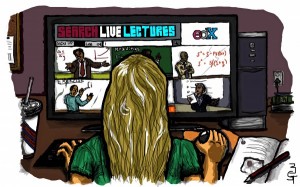McGill announced their decision to join the edX consortium on February 20th. The edX consortiums are a series of online classroom experiences founded by Harvard and MIT. The association offers massive open online courses (MOOCs), which provides students with free enrollment in an array of classes at major universities worldwide.
McGill Provost Anthony Masi and Anant Agarwal, President of edX, offered insights into the process of joining the edX as well as the potential benefits of edX research. McGill, along with four other universities outside the United States, were chosen to join edX as part of an initiative to globalize the consortium. According to Agarwal, McGill was selected for its “diversity, quality, and alignment with (the edX) mission,” as well as its “distinct expertise.”
Masi stated that McGill considered other online learning communities, including Coursea and Udacity, but edX was chosen over the others for its alignment with McGill’s principles, specifically its emphasis on research.
The edX consortium presents its research findings through an open-source platform, which allows other educators free access to said research. The open-source platform facilitates candid discussion among educators, and offers opportunities for people outside edX to learn from and contribute to the established platform.
McGill will offer courses in science, humanities, and public policy. Currently, enrollees will not be able to receive academic credit for edX’s offerings.
McGill’s adventure into the edX consortium will also be funded entirely from an outside operating budget. Hence, the creation of online courses will not take away from the funds specified towards on-campus learning.
So, what does McGill gain from this new membership in the consortium? As a member of edX, McGill will be at the forefront of innovations pertaining to online learning. Research using the massive data sets available through the edX will guide changes in on-campus education, including the creation of blended classrooms. In these blended classrooms, students will be able to watch lectures online, which will shift focus to interactive discussions and group work during class time.
On campus today, we already see some of these changes occurring. Many students opt to watch their lectures online instead of sitting in cramped lecture halls. edX proposes taking this one step further by having all its students watch lectures online and then later discuss the lecture materials in class. This would seemingly reverse the current learning process. Presently, students attend lectures, but expect that in order to understand or fully dissect the material, it is their duty to take the initiative and do so on their own time. Blended classrooms, through online learning communities, dissolve this tradition by looking into what will best facilitate learning for students. This means fostering a classroom environment focused on students rather than on lectures.
The growth of online classrooms is still a very new concept seeing as edX was founded just a little under a year ago. Even with this growing popularity, no one truly knows where the movement is headed, or just how big of an impact it will make. However, it is evident, as emphasized by Agarwal, that edX has no intention of replacing the university system. Online learning will be a seen as a tool to improve on-campus learning. Nevertheless, some people see the online learning movement as an alternative to higher education, especially in parts of the world where higher education is virtually inaccessible.
Agarwal comments on the ability of MOOCs to “equalize” access to education. He states that “Up to now, quality education – and in some cases, any higher education at all – has been the privilege of few. For some, economics has been a factor, for others, social status, gender, or geography. For edX, it is about quality and access to education.” Although MOOCs are not a substitute for a degree, they may provide valuable skills to people who otherwise would not be exposed to a higher form of education.
For those concerned with the rising costs of tuition and access to education, MOOCs are an appealing concept. Not only do they offer free classes worldwide, Agarwal predicts that the incorporation of blended classrooms and other technologies founded by edX will lower tuition rates at accredited universities. He also predicts overall increased satisfaction among students and professors.
Although the future of MOOCs is still unclear, being at the forefront of this growing trend is important for McGill’s future as a leading global university. The decision to join the consortium may be critical in the future as MOOCs and online classrooms become a standard practice. Masi notes, “The MOOC trend is already raising the stakes for course design, content, and delivery. McGill needs to play a leading role in this transformation.”
Illustration by Mohammad Khan








